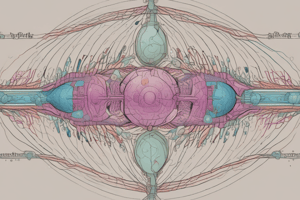Podcast
Questions and Answers
What happens when a hormone binds to a receptor in the second class?
What happens when a hormone binds to a receptor in the second class?
- A transcriptional co-activator is dislodged.
- A hormone is converted into a transcriptional co-activator.
- A transcriptional co-repressor is dislodged and a co-activator is recruited. (correct)
- A transcriptional co-repressor is recruited.
What is the role of a transcriptional co-repressor in the second class?
What is the role of a transcriptional co-repressor in the second class?
- It enhances gene expression.
- It inhibits gene expression. (correct)
- It is a type of hormone.
- It is involved in hormone binding.
What is the outcome of hormone binding in the second class?
What is the outcome of hormone binding in the second class?
- An increase in gene expression. (correct)
- Hormone degradation.
- A decrease in gene expression.
- No change in gene expression.
What is the role of a co-activator in the second class?
What is the role of a co-activator in the second class?
What is the mechanism of hormone action in the second class?
What is the mechanism of hormone action in the second class?
What is an additional way to regulate the availability of hormones that bind to carrier proteins?
What is an additional way to regulate the availability of hormones that bind to carrier proteins?
What type of hormones are being referred to in the context of carrier proteins?
What type of hormones are being referred to in the context of carrier proteins?
What is the primary function of carrier proteins in relation to hormones?
What is the primary function of carrier proteins in relation to hormones?
What is the consequence of regulating the expression and secretion of carrier proteins?
What is the consequence of regulating the expression and secretion of carrier proteins?
What is the molecular mechanism by which carrier proteins regulate hormone availability?
What is the molecular mechanism by which carrier proteins regulate hormone availability?
What is the primary role of target cells in the hormonal feedback mechanism?
What is the primary role of target cells in the hormonal feedback mechanism?
What is the effect of target cells' responsiveness on the endocrine organ?
What is the effect of target cells' responsiveness on the endocrine organ?
What is the direction of communication in the hormonal feedback mechanism?
What is the direction of communication in the hormonal feedback mechanism?
What is the purpose of the feedback mechanism in hormone regulation?
What is the purpose of the feedback mechanism in hormone regulation?
What is the advantage of the latter class of receptor?
What is the advantage of the latter class of receptor?
Which of the following is a characteristic of the latter class of receptor?
Which of the following is a characteristic of the latter class of receptor?
What is the outcome of the target cells' response to hormonal action?
What is the outcome of the target cells' response to hormonal action?
What does the latter class of receptor enable in terms of gene regulation?
What does the latter class of receptor enable in terms of gene regulation?
What is the effect of the latter class of receptor on gene regulation?
What is the effect of the latter class of receptor on gene regulation?
What is the significance of the latter class of receptor in terms of hormone regulation?
What is the significance of the latter class of receptor in terms of hormone regulation?
What is a feature of feedback control loops in endocrine disorders?
What is a feature of feedback control loops in endocrine disorders?
What is the primary application of feedback control loops in endocrinology?
What is the primary application of feedback control loops in endocrinology?
What do feedback control loops provide in the evaluation of endocrine disorders?
What do feedback control loops provide in the evaluation of endocrine disorders?
What is the significance of feedback control loops in endocrinology?
What is the significance of feedback control loops in endocrinology?
What is a characteristic of feedback control loops in endocrine disorders?
What is a characteristic of feedback control loops in endocrine disorders?
Flashcards are hidden until you start studying
Study Notes
Hormone Regulation
- Regulating hormone availability can be achieved by controlling expression and secretion of carrier proteins that bind to hormones like steroids.
Hormone Binding Mechanisms
- One class of hormone binding triggers the simultaneous dislodging of a transcriptional co-repressor and recruitment of a co-activator.
Regulation of Gene Expression
- This mechanism allows for a wider dynamic range of regulation of genes targeted by the hormone.
- It enables efficient responsiveness of target cells to hormonal action.
Feedback Control Loops
- Feedback control loops facilitate the regulation of hormone action by allowing target cells to "feed back" to the endocrine organ.
- These loops provide a diagnostic strategy for evaluating patients with suspected endocrine disorders.
Studying That Suits You
Use AI to generate personalized quizzes and flashcards to suit your learning preferences.




